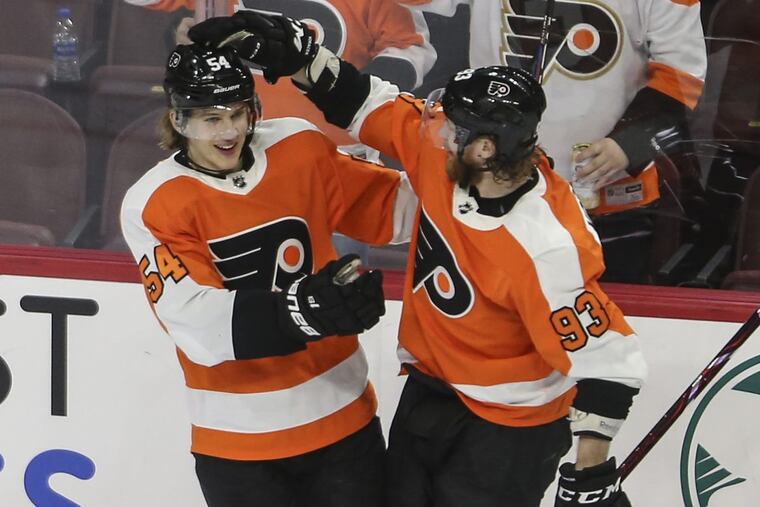Jake Voracek is a different player now, and against the Penguins, the Flyers will need him | Mike Sielski
Six years ago, Voracek helped the Flyers beat the Penguins in the playoffs. He thought that would be the start of a deep playoff run. He gets another chance this year.

The last time Jake Voracek took the ice for his first shift in a playoff series against the Pittsburgh Penguins, it was 2012, and he was in his first season with the Flyers, just 22 years old, and he hadn't played in a postseason game in three years, and he had forgotten just how frenzied it all was. "I was late everywhere," he said, and late is the last thing you want to be while skating a shift in the NHL playoffs, because a shift in the NHL playoffs is just about the most dangerous thing in sports. Every skater is a wide receiver going over the middle, exposed and vulnerable, except all the free safeties carry switchblades and crowbars.
"Always, the first period of the playoffs, it has nothing to do with hockey," Voracek was saying after the Flyers practiced Monday, two days before facing the Penguins again in the postseason. "It's only about hitting and not making mistakes and [keeping] your head up."
That series was bonkers, a swirl of end-to-end rushes and awful goaltending and hand-to-shoulder-to-elbow-to-stick combat. The Flyers gave up 10 goals in one game and scored eight in two others and won in six games. Voracek himself had seven points, including the overtime winner in Game 1. He was a young, rising player with the Flyers then, much like Nolan Patrick and Travis Konecny and Oskar Lindblom are now, and he thought that victory would be the start of a deep playoff push, one of many. Six years have gone by. He's 28. The Flyers haven't won a series since.
"You don't have much time anymore," he said. "You've got to make the run, and you appreciate every series in the playoffs. You appreciate it more."
It's natural he would. He's in a different place, at a different moment in his career, and to this point, the Flyers have gotten no closer to a Stanley Cup than they did when he was a supporting player. Even this season, Voracek's best in three years, was a testament to how far they have to go yet to achieve that goal. He had a career-high 85 points in 82 games, and Claude Giroux might win the Hart Trophy for his 34 goals and 102 points, and Sean Couturier, after never scoring more than 15 goals in any of his six previous seasons, had 31. Those three players were marvelous for most of the way, and still, the Flyers did not assure themselves of a playoff berth until they won their final regular-season game. And it would rightly be regarded as a terrific upset, maybe the most surprising of the entire first round, if they were to beat the Penguins, the two-time defending champions.
Coach Dave Hakstol had those three on the same line early in the season — Voracek on the right wing, as usual; Couturier at center; Giroux, for the first time in his career, on the left wing, free to be more creative offensively — and it worked for about 25 games. It stopped working for the same reason that such measures have often stopped working for the Flyers in recent years. They have been too top-heavy. They have had Giroux, Voracek, Wayne Simmonds, now Couturier, but little else. One of the best gauges of the Flyers' progress has always been this: You'll know they're really making strides when those three or four core forwards aren't necessarily their three or four best forwards.
If you're looking for cause to be encouraged ahead of this series, then, consider that Voracek maintained a comparable level of production this season even after Hakstol broke up that first line. Voracek now plays with Patrick and Lindblom, and at least that alignment gives the Flyers the possibility of more scoring depth and balance, provided the two rookies aren't overwhelmed by the moment.
"Both Oskar and Paddy, they're short on experience, but they've got a ton of hockey sense, and I think Jake has done a really good job meshing with those guys," Hakstol said. "Right now, as a group, they read pretty well off each other. They're continuing to build what is good chemistry, and you see little things in their game almost every week. That's been a positive, and he's been a driving force there."
The change in linemates had an immediate effect on Voracek, perhaps the most vocal and emotional player on the Flyers' roster: It calmed him down. It compelled him to be less emotional, less demonstrative. "You know Jake," Giroux said. "When he yells, 80 percent of the time he yells at himself. If he does it now, with the young guys, they might think, 'Oh, Jake's mad at me.' When we play together, we don't have that. If he yells, I just tell him to shut up, and we move on."
"I've known them for such a long time, and they're older guys who, when I get pissed off or they get pissed off, we can all handle it," Voracek said. "I'm an explosive guy. Sometimes, I snap. When you have a 19-year-old kid and a 21-year-old kid on the line, it's hard. When they see the older guy getting upset, they think it's about them. What did they do wrong? They start thinking about it. So I kind of kept my emotions together while I was playing with them."
It worked during the regular season. This isn't the regular season. This is different hockey. At times, it isn't even really hockey. It's something more, or less. Six years have gone by, but Jake Voracek remembers that much.